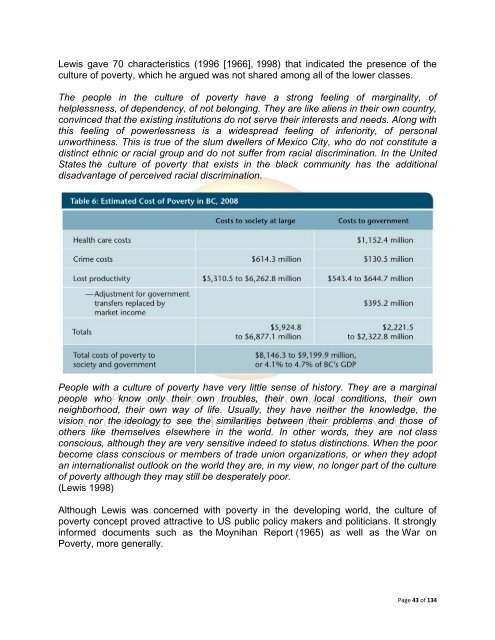Concentrated Poverty
Concentrated Poverty
Concentrated Poverty
Create successful ePaper yourself
Turn your PDF publications into a flip-book with our unique Google optimized e-Paper software.
Lewis gave 70 characteristics (1996 [1966], 1998) that indicated the presence of the<br />
culture of poverty, which he argued was not shared among all of the lower classes.<br />
The people in the culture of poverty have a strong feeling of marginality, of<br />
helplessness, of dependency, of not belonging. They are like aliens in their own country,<br />
convinced that the existing institutions do not serve their interests and needs. Along with<br />
this feeling of powerlessness is a widespread feeling of inferiority, of personal<br />
unworthiness. This is true of the slum dwellers of Mexico City, who do not constitute a<br />
distinct ethnic or racial group and do not suffer from racial discrimination. In the United<br />
States the culture of poverty that exists in the black community has the additional<br />
disadvantage of perceived racial discrimination.<br />
People with a culture of poverty have very little sense of history. They are a marginal<br />
people who know only their own troubles, their own local conditions, their own<br />
neighborhood, their own way of life. Usually, they have neither the knowledge, the<br />
vision nor the ideology to see the similarities between their problems and those of<br />
others like themselves elsewhere in the world. In other words, they are not class<br />
conscious, although they are very sensitive indeed to status distinctions. When the poor<br />
become class conscious or members of trade union organizations, or when they adopt<br />
an internationalist outlook on the world they are, in my view, no longer part of the culture<br />
of poverty although they may still be desperately poor.<br />
(Lewis 1998)<br />
Although Lewis was concerned with poverty in the developing world, the culture of<br />
poverty concept proved attractive to US public policy makers and politicians. It strongly<br />
informed documents such as the Moynihan Report (1965) as well as the War on<br />
<strong>Poverty</strong>, more generally.<br />
Page 43 of 134

















